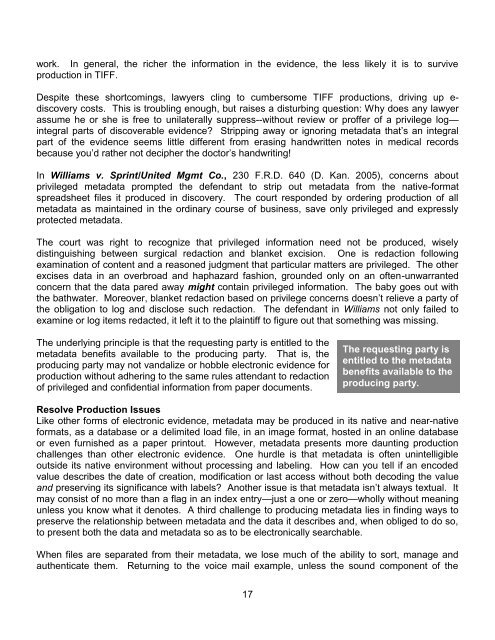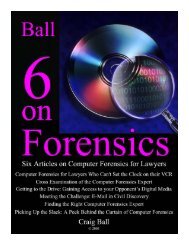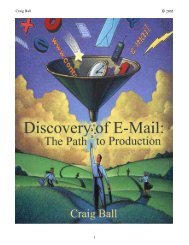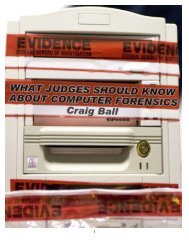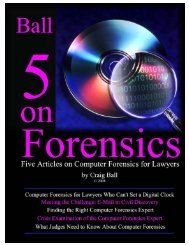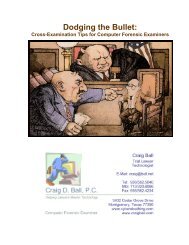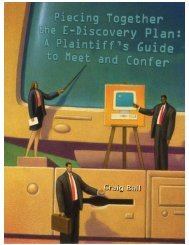Litigator's Guide to Metadata - Codemantra.net
Litigator's Guide to Metadata - Codemantra.net
Litigator's Guide to Metadata - Codemantra.net
- No tags were found...
You also want an ePaper? Increase the reach of your titles
YUMPU automatically turns print PDFs into web optimized ePapers that Google loves.
work. In general, the richer the information in the evidence, the less likely it is <strong>to</strong> surviveproduction in TIFF.Despite these shortcomings, lawyers cling <strong>to</strong> cumbersome TIFF productions, driving up e-discovery costs. This is troubling enough, but raises a disturbing question: Why does any lawyerassume he or she is free <strong>to</strong> unilaterally suppress--without review or proffer of a privilege log—integral parts of discoverable evidence? Stripping away or ignoring metadata that’s an integralpart of the evidence seems little different from erasing handwritten notes in medical recordsbecause you’d rather not decipher the doc<strong>to</strong>r’s handwriting!In Williams v. Sprint/United Mgmt Co., 230 F.R.D. 640 (D. Kan. 2005), concerns aboutprivileged metadata prompted the defendant <strong>to</strong> strip out metadata from the native-formatspreadsheet files it produced in discovery. The court responded by ordering production of allmetadata as maintained in the ordinary course of business, save only privileged and expresslyprotected metadata.The court was right <strong>to</strong> recognize that privileged information need not be produced, wiselydistinguishing between surgical redaction and blanket excision. One is redaction followingexamination of content and a reasoned judgment that particular matters are privileged. The otherexcises data in an overbroad and haphazard fashion, grounded only on an often-unwarrantedconcern that the data pared away might contain privileged information. The baby goes out withthe bathwater. Moreover, blanket redaction based on privilege concerns doesn’t relieve a party ofthe obligation <strong>to</strong> log and disclose such redaction. The defendant in Williams not only failed <strong>to</strong>examine or log items redacted, it left it <strong>to</strong> the plaintiff <strong>to</strong> figure out that something was missing.The underlying principle is that the requesting party is entitled <strong>to</strong> themetadata benefits available <strong>to</strong> the producing party. That is, theproducing party may not vandalize or hobble electronic evidence forproduction without adhering <strong>to</strong> the same rules attendant <strong>to</strong> redactionof privileged and confidential information from paper documents.The requesting party isentitled <strong>to</strong> the metadatabenefits available <strong>to</strong> theproducing party.Resolve Production IssuesLike other forms of electronic evidence, metadata may be produced in its native and near-nativeformats, as a database or a delimited load file, in an image format, hosted in an online databaseor even furnished as a paper prin<strong>to</strong>ut. However, metadata presents more daunting productionchallenges than other electronic evidence. One hurdle is that metadata is often unintelligibleoutside its native environment without processing and labeling. How can you tell if an encodedvalue describes the date of creation, modification or last access without both decoding the valueand preserving its significance with labels? Another issue is that metadata isn’t always textual. Itmay consist of no more than a flag in an index entry—just a one or zero—wholly without meaningunless you know what it denotes. A third challenge <strong>to</strong> producing metadata lies in finding ways <strong>to</strong>preserve the relationship between metadata and the data it describes and, when obliged <strong>to</strong> do so,<strong>to</strong> present both the data and metadata so as <strong>to</strong> be electronically searchable.When files are separated from their metadata, we lose much of the ability <strong>to</strong> sort, manage andauthenticate them. Returning <strong>to</strong> the voice mail example, unless the sound component of the17


